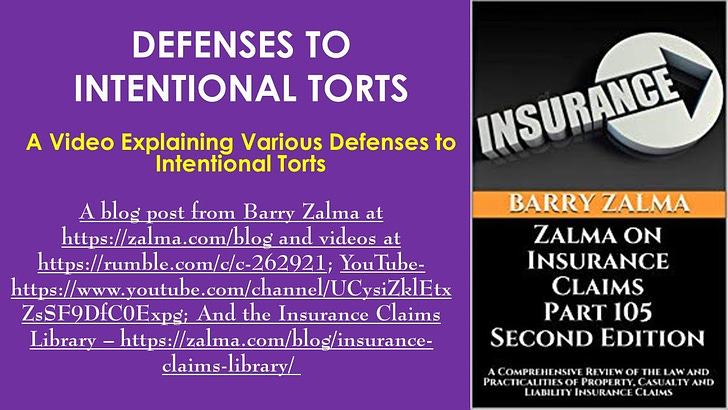Read the full article at https://www.linkedin.com/pulse/defenses-intentional-torts-barry-zalma-esq-cfe and see the full video at https://rumble.com/vicm67-defenses-to-intentional-torts.html?mref=6zof&mrefc=2 and at
and at https://zalma.com/blog plus more than 3750 posts.
Self-Defense and Defense of a Third Party
The California Civil Code states:
Any necessary force may be used to protect from wrongful injury the person or property of oneself, or of a wife, husband, child, parent, or other relative, or member of one’s family, or of a ward, servant, master or guest. (California Civil Code § 50)
The person must reasonably believe that danger exists, and must use only such force as is reasonably necessary.
Defenses to Battery—Use of Deadly Force
Deadly force or force likely to cause bodily harm is not justified merely in defense of property. Spring guns or other deadly mechanical devices are to be used only if deadly force is justifiable. Deadly force may be used against a felonious trespasser.
Use of Reasonable Force
This is always a defense. For example:
holding a violent person’s arms behind his back;
striking a dog about to attack a child;
holding a person who was intentionally striking a child; or
escorting a trespasser off the premises.
Defenses to Defamation, Including Libel and Slander
Defenses to False Imprisonment
Reasonable detention without arrest is a judicial privilege codified by California Penal Code § 490.5(f)(1). For example, a storekeeper who believes a theft has been committed may detain the suspected person for a reasonable time.
Defense of Champerty And Maintenance
Using venture capital to finance litigation has been tolerated in many states because defendants often have more funds available than injured plaintiffs. Recently, the Ohio Supreme Court, and a few others, have called into question whether such arrangements violate the traditional rule against champerty and maintenance.




